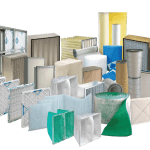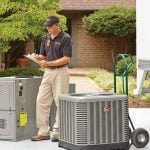Elevate your home comfort with our comprehensive guide on HVAC heating optimization. Discover expert troubleshooting tips for efficient heating, covering everything from routine maintenance to DIY solutions. This guide empowers you to take control of your home’s warmth and coziness. Check out our comparison table for quick reference and equip yourself with the knowledge to ensure your HVAC system operates at its best. From professional maintenance to addressing common issues, this guide is your key to a comfortable and efficient home environment.
10 HVAC Troubleshooting Tips for Efficient Home Comfort
Facing heating issues in your home can be uncomfortable, especially during colder seasons. In this comprehensive guide, we will delve into expert HVAC troubleshooting tips to ensure your home stays warm and cozy. From routine maintenance to DIY solutions, discover the key to efficient heating for your living space.
1. Professional Maintenance:
Kickstart your journey to optimal home comfort by prioritizing professional HVAC maintenance. Schedule annual check-ups with certified technicians to guarantee a well-maintained heating system.
2. Routine Maintenance:
Take control of your home’s comfort by implementing routine maintenance tasks. Regularly cleaning or replacing air filters is a simple yet effective way to ensure your HVAC system functions at its best.
3. DIY Troubleshooting:
Empower yourself with the knowledge of DIY troubleshooting. Recognize common issues, such as unusual noises or inconsistent heating, and learn how to address them efficiently.
4. Thermostat Issues:
Begin your HVAC optimization by examining thermostat settings. Ensure your thermostat is calibrated to your desired temperature, optimizing the efficiency of your heating system.
5. Air Filters:
At the heart of efficient heating is the cleanliness of your air filters. Commence your optimization efforts by regularly cleaning or replacing filters, promoting proper airflow throughout your home.
6. Vents Obstruction:
Elevate your home’s comfort by inspecting vents for obstructions. Unobstructed vents contribute to optimal airflow, ensuring consistent heating in every corner of your living space.
7. Turn Off the AC:
At the forefront of HVAC optimization is a simple action – turn off the AC during the heating season. Prevent unnecessary strain on your system and reduce energy consumption by ensuring only one system operates at a time.
8. Furnace Troubleshooting:
Embark on furnace optimization by learning to troubleshoot common issues. From pilot light problems to unusual noises, equip yourself with the skills to address furnace issues promptly.
9. Heat Pump Maintenance:
Optimize your home’s heating with regular maintenance for heat pumps. Keep the outdoor unit debris-free and ensure proper defrosting during colder temperatures.
10. HVAC System Repair:
Initiate HVAC optimization by addressing persistent issues promptly. If DIY solutions fall short, seek professional HVAC system repair to prevent extensive damage and maintain a cozy home environment.
Comparison Table: HVAC Heating Troubleshooting
| Issue | Possible Cause | DIY Solution | Professional Help |
|---|---|---|---|
| Inconsistent Heating | Thermostat Settings | Recalibrate or Replace Thermostat | HVAC System Repair |
| Unusual Noises | Furnace or Heat Pump Issues | Check and Repair Components | Furnace or Heat Pump Maintenance |
| Airflow Problems | Clogged Air Filters | Clean or Replace Filters | HVAC System Repair |
| Pilot Light Issues | Furnace Troubles | Relight Pilot Light | Furnace Troubleshooting |
| Leaking HVAC System | Condensate Line or Pump Failure | Unclog or Replace Components | HVAC System Repair |
Conclusion
Achieving optimal home comfort requires proactive HVAC troubleshooting. By incorporating professional and DIY maintenance, addressing common issues, and staying vigilant with routine tasks, you can ensure your heating system operates efficiently. Regularly check and clean air filters, inspect vents, and be aware of thermostat settings. If problems persist, seek professional help promptly to prevent more extensive damage and ensure a cozy home throughout the seasons.
Frequently Asked Questions (FAQ)
Q1: How often should I replace my air filters?
A1: Air filters should generally be replaced every 1-3 months, but it depends on factors such as the type of filter, household conditions, and system usage. Check the manufacturer’s recommendations for your specific filter.
Q2: Can I troubleshoot my furnace without professional help?
A2: Yes, you can troubleshoot basic furnace issues like checking the thermostat, inspecting the pilot light, and listening for unusual noises. However, for more complex problems or if you’re uncomfortable, it’s advisable to consult a professional.
Q3: What routine maintenance tasks can I perform for my HVAC system?
A3: Routine maintenance tasks include cleaning or replacing air filters, ensuring proper airflow by keeping vents unobstructed, and scheduling professional check-ups annually. Refer to your system’s user manual for specific guidelines.
Q4: How do I know if my heat pump needs maintenance?
A4: Signs that your heat pump needs maintenance include reduced heating efficiency, strange noises, or ice buildup on the outdoor unit during winter. Regularly check and clean the outdoor unit, and consider scheduling professional maintenance annually.
Q5: Why is professional HVAC maintenance important?
A5: Professional HVAC maintenance ensures that your system operates efficiently, identifies potential issues before they escalate, and extends the lifespan of your heating system. Schedule annual check-ups to keep your HVAC system in top shape. Professional technicians have the expertise to detect and address issues that may not be apparent during DIY troubleshooting.





